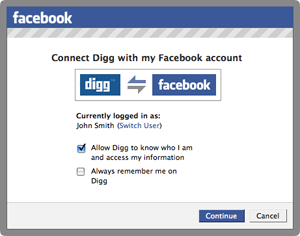 A few select partner sites are beginning to roll out their integration with Facebook’s ID system through Facebook Connect. Last week, a CBS site was the first one to do so, and more are expected to go live soon. Digg will be one of them. (Other announced partners include Six Apart, ABC, CBS, Hulu, Kongregate, Loopt, Plaxo, Seesmic, StumbleUpon, Twitter, Vimeo, and Xobni). During a speech at the Web 2.0 Expo last week (video embedded below), Digg CEO Jay Adelson hinted at how Facebook Connect could help the social news site take “the next step of collaborative filtering” and how it is tied to the “future of Digg.”
A few select partner sites are beginning to roll out their integration with Facebook’s ID system through Facebook Connect. Last week, a CBS site was the first one to do so, and more are expected to go live soon. Digg will be one of them. (Other announced partners include Six Apart, ABC, CBS, Hulu, Kongregate, Loopt, Plaxo, Seesmic, StumbleUpon, Twitter, Vimeo, and Xobni). During a speech at the Web 2.0 Expo last week (video embedded below), Digg CEO Jay Adelson hinted at how Facebook Connect could help the social news site take “the next step of collaborative filtering” and how it is tied to the “future of Digg.”
At the most basic level, Facebook Connect will let you sign into Digg and all of these other partner Websites with nothing more than your Facebook username and password. Facebook wants to become the universal ID on the Web, and any progress it makes on that front would be a big deal in its own right. But Facebook Connect goes well beyond an ID management system. Partners can tap into all sorts of social data people put into their Facebook profiles, and actions on partner sites can be reflected back on your Facebook News Feed in a Beacon-like manner.
For Digg, Facebook Connect will help it personalize the headlines it shows to each member. During his presentation at Web 2.0 Expo, Adelson said:
We are about to add like 90 million registered Facebook users to Digg. How can I take that so your Frontpage experience is particular to you?
Adelson’s speech was about collaborative filtering and how the general, zeitgeist-type of collaborative filtering that Digg does already is merging with the more personal filtering that occurs on your activity stream in Facebook and elsewhere. He believes that the combination of the two will be particularly powerful:
It is the next step of collaborative filtering. It is the idea that instead of looking at a social network that you’ve created yourself, that you’ve entered in the names, I am going to look at all of you, everyone, and I’m going to compare you all together. I am going to find people like you and I am going to use that collective wisdom to find things that are more specifically interesting to you.
. . . When I think about the future of Digg. We have 16,000 submissions a day to the Digg platform. How are we going to take all of that data and make it interesting and relevant without this idea of the collaborative filter? Initially all we had was Diggs and buries. But I have a lot more data about how you use the data, where you come in from, and what your interests are.
Digg is already moving in this direction with its new recommendation system, which has resulted in a 40 percent increase in Diggs. But Facebook has a much richer set of data about your personal likes, dislikes, and recent activity across a broad spectrum of interests.
What Adelson is suggesting is that it is not enough to know what your group of self-selected friends and followers are buzzing about. What you really want to know is what are like-minded people buzzing about whether you know them or not. This is not a particularly new idea. (Last.fm, for instance, has been using this approach and the concept of musical “neighbors” to create personalized music recommendations for years). But what is new is the fact that a site like Digg will be able to improve its own core service by tapping into someone else’s repository of social data. And arguably, Facebook has a bigger and better repository of such data than nearly anyone else.
(Hat tip to Paul Sanchez for spotting the video).